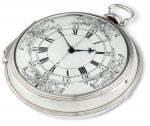 On this day 29 March 1776 – Harrison’s Chronometer and the calculation of longitude
On this day 29 March 1776 – Harrison’s Chronometer and the calculation of longitude
John Harrison, Captain Cook’s chronometer maker died on this day.
In 1714 the British Parliament passed the Longitude Act, with a prize of £20,000 ( $2.5 Million 2016) prize for the person who could invent a means of finding longitude to an accuracy of 30 miles after a six week voyage from the English Channel to the West Indies.
A self taught clock maker John Harrison undertook this challenge with no formal education or training. He was going head to head with the Astronomer Royal, Nevil Maskelyne, the most prominent proponent of a complex mathematical and astronomy-based method using lunar charts and tables. He believed that using a mechanical time piece was irrelevant.
It became the life-long work of both men to prove their point.
Cook took Harrison’s H-4 chronometer on his second voyage (1772-1774). It enabled him to accurately chart his Pacific discoveries including Hawaii
On Cook’s return Harrison did not win the entire prize. He was awarded a little more than half. Instead in 1774 Parliament changed the rules for winning the prize; all entries must be submitted in duplicate, undergo testing for one year at Greenwich, be further tested on approved voyages by the board.
John Harrison died on his 83rd birthday on March 29, 1776 still protesting that Cook’s endorsement of H4 proved that he had won the whole prize fair and square.
The accurate marine chronometers he pioneered saved thousands of lives during the age of sail as navigators knew where they were and how close to land. That made safe regular migration to Australia possible.
